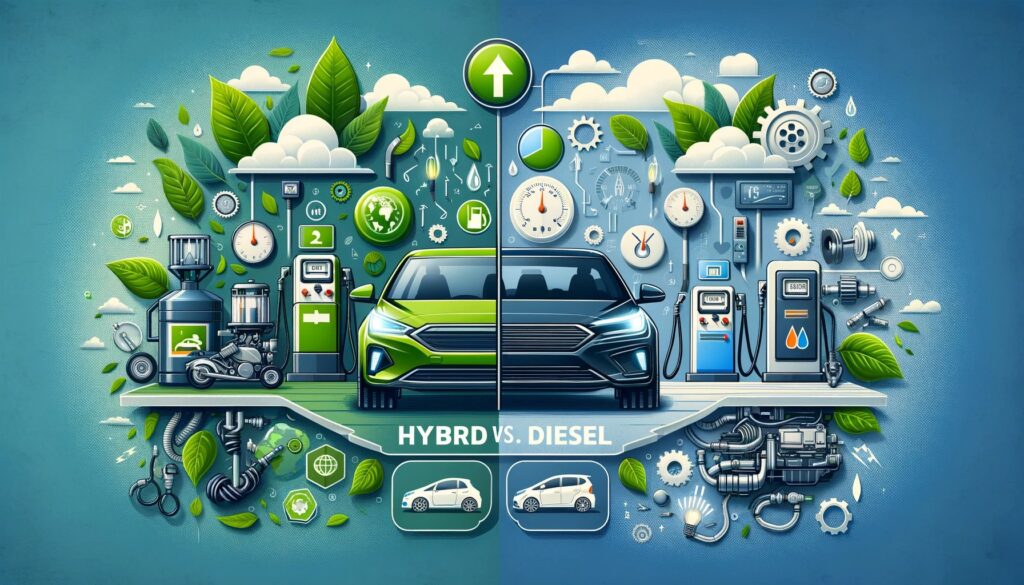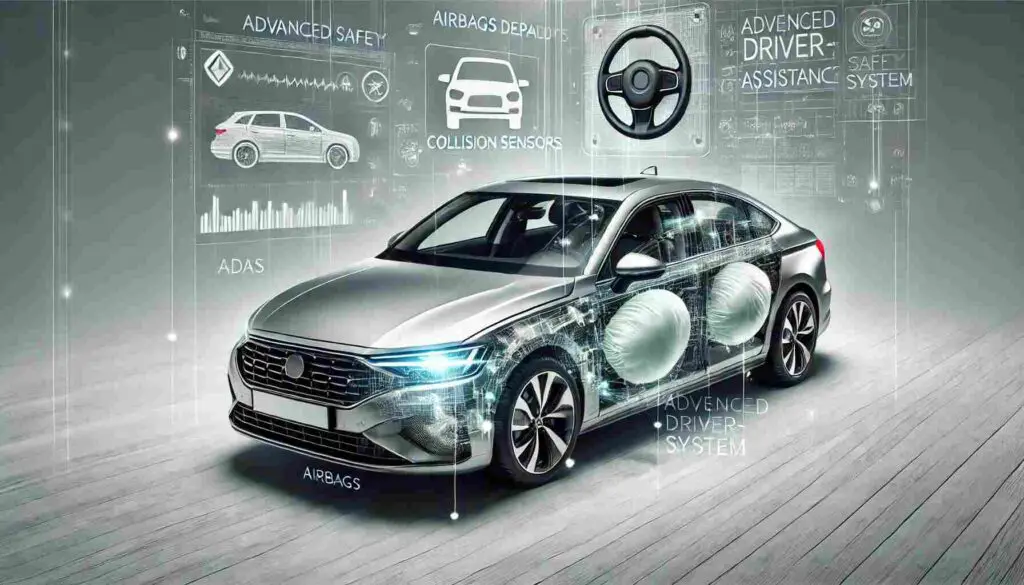In the contemporary automotive landscape, the pursuit of efficiency stands as a paramount consideration for consumers. As individuals increasingly prioritize environmental impact and fuel expenditure, the discourse surrounding hybrid and diesel cars intensifies. In this comprehensive comparison, we aim to furnish readers with insightful details to facilitate informed decision-making.
| Aspect | Hybrid Cars | Diesel Cars |
|---|---|---|
| Power Source | Combination of internal combustion engine & electric motor | Solely relies on compression ignition engine |
| Fuel Efficiency | Excellently suited for city driving conditions | Superior performance on highways |
| Environmental Impact | Emit fewer pollutants in urban areas | Lower emissions & enhanced fuel economy on highways |
| Cost Considerations | Higher upfront costs offset by lower maintenance | Initial affordability often outweighed by maintenance costs |
| Maintenance Needs | Generally require less maintenance due to simpler drivetrains | May offer longer intervals between servicing |
| Availability | Predominantly available in urban areas | Popular in regions with extensive highway commutes |
| Driving Habits | Favorable for urban commuters due to efficiency in stop-and-go traffic | Preferred by highway travelers for superior mileage |
| Pros | Lower emissions, excel in urban environments | Superior highway mileage, initial affordability |
| Cons | Higher upfront costs, less efficient on highways | Scrutiny over emissions, potential for higher maintenance costs |
Understanding Hybrid Cars
Hybrid vehicles amalgamate internal combustion engines with electric motors, orchestrating a symbiotic interplay to optimize fuel efficiency. Through the implementation of regenerative braking and seamless power source transitions, hybrids epitomize remarkable fuel economy, particularly in bustling urban environments characterized by frequent stops and starts.
Delving into Diesel Cars: Unraveling Their Engineering Marvels
Robust Torque Delivery
Diesel automobiles are celebrated for their robust torque delivery, a result of their compression ignition engines. Unlike traditional gasoline engines, which rely on spark plugs to ignite the air-fuel mixture, diesel engines compress the air to a high temperature, causing the diesel fuel to spontaneously ignite. This process generates significant torque at lower engine speeds, making diesel cars ideal for towing heavy loads and providing a responsive driving experience.
Long-Distance Efficiency Prowess
One of the hallmark features of diesel cars is their exceptional efficiency over long distances. This efficiency stems from the inherent properties of diesel fuel, which contains more energy per gallon compared to gasoline. Additionally, diesel engines operate at higher compression ratios, resulting in better thermal efficiency and fuel consumption. As a result, diesel cars are renowned for their ability to traverse extensive distances on a single tank of fuel, making them a preferred choice for long-haul commuters and road-trippers.
Technological Advancements
In recent years, diesel engine technology has undergone significant advancements to address environmental concerns and regulatory standards. Innovations such as advanced fuel injection systems, exhaust gas recirculation (EGR), and selective catalytic reduction (SCR) have enabled modern diesel engines to achieve lower emissions while maintaining their fuel efficiency. Additionally, the integration of turbocharging and variable valve timing technologies has enhanced engine performance and responsiveness, further bolstering the appeal of diesel cars in the automotive market.
Environmental Apprehensions Assuaged
Despite historical concerns regarding diesel emissions, modern diesel cars have made substantial strides in mitigating environmental impact. Advanced emissions control systems, including diesel particulate filters (DPF) and lean NOx traps, effectively capture and reduce harmful pollutants emitted from diesel exhaust. Furthermore, the widespread adoption of ultra-low sulfur diesel (ULSD) fuel has contributed to cleaner combustion and reduced emissions of sulfur dioxide, a major contributor to air pollution.
Celebrated Fuel Efficiency on Highways
One of the primary advantages of diesel cars lies in their superior fuel efficiency on highways. The high torque output of diesel engines allows vehicles to maintain steady speeds with minimal effort, resulting in optimal fuel consumption during extended highway cruising. As a result, diesel cars often outperform their gasoline counterparts in terms of miles per gallon (MPG) on long-distance journeys, offering drivers a cost-effective and efficient means of transportation for intercity travel.
Fuel Efficiency Comparison: Hybrid vs. Diesel Cars
In the dynamic landscape of fuel efficiency, both hybrid and diesel cars offer distinctive advantages tailored to specific driving scenarios. Let’s delve into a comparative analysis to elucidate their respective strengths:
Hybrid Cars: Urban Efficiency Champions
Hybrid vehicles showcase their prowess in urban environments, where frequent stops and starts typify daily commutes. The seamless integration of internal combustion engines with electric motors empowers hybrids to excel in stop-and-go traffic situations. During deceleration, regenerative braking harnesses kinetic energy, converting it into electric power to supplement propulsion. This innovative technology enhances fuel economy by minimizing energy wastage, making hybrids an optimal choice for city driving scenarios.
Diesel Cars: Highway Mileage Maestros
In contrast, diesel cars establish their dominance on highways, where sustained cruising at steady speeds prevails. The efficient combustion engines inherent in diesel vehicles exhibit remarkable fuel efficiency over extended distances. The high compression ratios characteristic of diesel engines facilitate complete combustion of fuel, maximizing energy utilization and minimizing fuel consumption. Consequently, diesel cars outshine their counterparts on highways, delivering unparalleled mileage and cost-effectiveness for long-distance journeys.
Comparative Analysis
When evaluating fuel efficiency, the choice between hybrid and diesel cars hinges on driving patterns and usage preferences. Urban commuters navigating congested city streets may find hybrids to be the optimal solution, capitalizing on their electric motors’ efficiency in stop-and-go traffic. Conversely, highway travelers embarking on extensive journeys may gravitate towards diesel cars, leveraging their superior highway mileage credentials to minimize fuel expenditure over extended distances.
Environmental Impact Assessment: Hybrid vs. Diesel Cars
Assessing the environmental implications of automotive choices is paramount in today’s conscientious society. Let’s delve into a comparative analysis of the environmental impact of hybrid and diesel cars:
Hybrids: Green Urban Pioneers
Hybrid cars stand out as environmentally friendly options, particularly in urban settings where air quality concerns are prevalent. Their innovative technology, combining internal combustion engines with electric motors, results in lower emissions of greenhouse gases and pollutants compared to traditional gasoline vehicles. The electric motors in hybrids contribute to reduced tailpipe emissions, especially during stop-and-go traffic situations where conventional vehicles emit higher levels of pollutants. As a result, hybrids play a pivotal role in mitigating urban air pollution and fostering cleaner city environments.
Diesel Cars: Highway Efficiency with Reduced Emissions
While diesel cars have traditionally faced scrutiny over emissions, modern advancements have significantly improved their environmental performance. Diesel engines boast enhanced fuel economy and lower carbon dioxide emissions compared to gasoline counterparts, making them particularly well-suited for highway driving. The high efficiency of diesel engines allows for reduced fuel consumption per mile traveled, resulting in diminished greenhouse gas emissions on long-distance journeys. Additionally, advancements in emissions control technologies, such as diesel particulate filters and selective catalytic reduction systems, have substantially reduced harmful pollutants emitted by diesel vehicles, further enhancing their environmental credentials.
Comparative Analysis
When evaluating the environmental impact of hybrid and diesel cars, it’s essential to consider the specific driving conditions and usage patterns. Hybrids shine in urban environments, where their electric motors excel in reducing emissions during frequent stops and starts. Conversely, diesel cars demonstrate superior performance on highways, emitting fewer pollutants and greenhouse gases per mile traveled, thanks to their efficient combustion engines and enhanced fuel economy.
Maintenance Needs: Hybrid vs. Diesel Cars
Maintenance requirements play a crucial role in the overall ownership experience of a vehicle. Let’s delve into the maintenance needs of hybrid and diesel cars to understand their differences:
Hybrids: Simplified Maintenance Regimens
Hybrid cars are renowned for their simplified maintenance needs, owing to their innovative technology and fewer components prone to wear and tear. The electric motors in hybrids operate with minimal friction, resulting in reduced mechanical stress and lower maintenance requirements. Additionally, regenerative braking systems help prolong the lifespan of brake pads and rotors, further minimizing maintenance intervals. Overall, hybrids offer a hassle-free ownership experience with fewer visits to the service center.
Diesel Cars: Extended Servicing Intervals
On the other hand, diesel vehicles may offer lengthier intervals between servicing, particularly for drivers engaged in long-distance journeys. Diesel engines are known for their robust construction and durability, allowing them to withstand higher mileage without compromising performance. Additionally, advancements in engine technology have improved the reliability and longevity of diesel powertrains, reducing the frequency of maintenance tasks such as oil changes and engine inspections. As a result, diesel cars provide a convenient ownership experience with less frequent trips to the mechanic.
Comparative Analysis
While hybrids boast simplified maintenance regimens, diesel cars offer extended servicing intervals, catering to different driving habits and usage patterns. Urban commuters and city dwellers may find hybrids to be more convenient due to their reduced maintenance needs and lower likelihood of unexpected repairs. In contrast, highway travelers and long-distance drivers may prefer diesel cars for their durability and reliability over extended journeys.
Conclusion
In conclusion, the maintenance needs of hybrid and diesel cars vary based on factors such as driving habits and usage preferences. Hybrids offer simplified maintenance regimens with fewer components prone to wear and tear, making them an ideal choice for urban commuters. Conversely, diesel cars provide extended servicing intervals and enhanced durability, catering to the needs of highway travelers and long-distance voyagers. By understanding the maintenance requirements of each vehicle type, consumers can make informed decisions that align with their lifestyle and driving habits.
Availability of Options: Hybrid vs. Diesel Cars
The availability of hybrid and diesel cars varies significantly based on regional disparities and market demand dynamics. Let’s explore how these factors influence the accessibility of both vehicle types:
Hybrids: Urban Dominance
Hybrid cars predominantly assert their dominance in urban locales, where environmental consciousness and fuel efficiency are paramount considerations among consumers. Major metropolitan areas and densely populated cities often exhibit a higher demand for hybrids, driven by incentives for eco-friendly vehicles and growing concerns over air quality. As a result, consumers in urban environments enjoy a wide array of hybrid options across various vehicle segments, ranging from compact hatchbacks to spacious SUVs.
Diesel Cars: Highway Preference
In contrast, diesel cars maintain popularity in regions predisposed to extensive highway commutes and long-distance driving. Rural areas, suburban communities, and regions with limited access to public transportation often favor diesel vehicles due to their superior fuel efficiency and robust performance on highways. The high torque output and extended range offered by diesel engines make them an attractive choice for drivers embarking on intercity journeys or traversing vast expanses of open road. Consequently, diesel car enthusiasts have access to a diverse selection of models tailored to their specific needs and preferences.
Comparative Analysis
The availability of hybrid and diesel cars is influenced by a myriad of factors, including consumer preferences, regulatory incentives, and infrastructure development. While hybrids dominate urban landscapes, diesel cars cater to drivers seeking long-distance efficiency and highway performance. The contrasting availability of both vehicle types reflects the diverse needs and priorities of consumers across different regions and market segments.
Driving Habits and Efficiency: Impact on Vehicle Choice
The efficiency of a vehicle is greatly influenced by the driving habits of its owner. Let’s explore how individual driving patterns affect the choice between hybrid and diesel cars:
Urban Commuters: Advantages of Hybrids
For urban commuters navigating congested streets and stop-and-go traffic, hybrids offer significant advantages in terms of efficiency. The electric motors in hybrids excel in low-speed driving conditions, making them well-suited for urban environments. During frequent stops, hybrids utilize regenerative braking to recapture kinetic energy and recharge the battery, reducing fuel consumption and emissions. As a result, urban commuters can benefit from the enhanced efficiency of hybrids, particularly in city driving scenarios where fuel economy is critical.
Highway Travelers: Preference for Diesel Cars
In contrast, frequent highway travelers prioritize efficiency over long-distance journeys, making diesel cars an attractive choice. Diesel engines are renowned for their superior highway mileage credentials, delivering optimal fuel efficiency at steady cruising speeds. The high torque output of diesel engines allows vehicles to maintain consistent speeds with minimal effort, further enhancing fuel economy on extended highway routes. As a result, highway travelers can capitalize on the efficiency of diesel cars, minimizing fuel expenditure and maximizing range during intercity commutes.
Comparative Analysis
The choice between hybrid and diesel cars ultimately boils down to individual driving habits and usage patterns. Urban commuters seeking fuel efficiency and environmental sustainability may lean towards hybrids, while highway travelers prioritizing long-distance efficiency may opt for diesel cars. By aligning vehicle choice with specific driving requirements, consumers can optimize efficiency and enhance overall driving satisfaction.
Pros and Cons Overview: Hybrid vs. Diesel Cars
When considering the choice between hybrid and diesel cars, it’s essential to weigh the pros and cons of each vehicle type. Let’s delve into the advantages and disadvantages of hybrids and diesel cars:
Hybrids
Pros:
- Lower Emissions: Hybrids boast lower emissions compared to traditional gasoline vehicles, making them environmentally friendly options.
- Urban Efficiency: Hybrids excel in urban environments, thanks to their electric motors’ efficiency in stop-and-go traffic.
- Reduced Fuel Consumption: The hybrid technology optimizes fuel consumption, resulting in cost savings over time, especially in city driving conditions.
Cons:
- Higher Upfront Costs: Hybrids often come with a higher initial purchase price due to the advanced technology involved.
- Complexity: The hybrid drivetrain is more complex than traditional gasoline or diesel engines, potentially leading to higher maintenance costs.
- Battery Degradation: Over time, hybrid batteries may degrade, requiring costly replacements, which can offset initial fuel savings.
Diesel Cars
Pros:
- Superior Highway Mileage: Diesel cars offer exceptional fuel efficiency on highways, resulting in fewer fuel stops during long-distance journeys.
- Initial Affordability: Diesel cars typically have lower upfront costs compared to hybrids, making them more accessible to budget-conscious buyers.
- Longevity: Diesel engines are known for their durability and longevity, requiring fewer repairs and enjoying a longer lifespan than gasoline engines.
Cons:
- Emissions Concerns: Diesel cars face scrutiny over emissions, particularly in urban areas, where they may contribute to air pollution.
- Higher Emissions: While diesel cars emit fewer greenhouse gases than gasoline vehicles, they produce higher levels of nitrogen oxides (NOx) and particulate matter.
- Complex Emissions Systems: Modern diesel engines are equipped with complex emissions control systems, which can increase maintenance costs and potential failure points.
Comparative Analysis
While hybrids offer lower emissions and excel in urban environments, diesel cars provide superior highway mileage and initial affordability. The choice between the two ultimately depends on individual preferences, driving habits, and environmental considerations.
Considering a Diesel Car: Evaluating Suitability and Cost-Benefit Analysis
Contemplating the purchase of a diesel car requires a thorough evaluation of its suitability to driving conditions and a comprehensive cost-benefit analysis. Let’s explore the key considerations when considering a diesel vehicle:
Suitability to Driving Conditions
Assess the suitability of a diesel car to your typical driving conditions and usage patterns. Diesel cars thrive in long-distance driving scenarios, where their superior highway mileage and fuel efficiency shine. If you frequently embark on intercity journeys or traverse extensive highway routes, a diesel car may be an enticing proposition. However, for urban commuters navigating congested city streets, the benefits of a diesel car may be limited, as their efficiency is optimized at steady cruising speeds.
Comprehensive Cost-Benefit Analysis
Conduct a comprehensive cost-benefit analysis to evaluate the financial implications of owning a diesel car. Consider factors such as initial purchase price, fuel costs, maintenance expenses, and potential resale value. While diesel cars may offer initial affordability and superior highway mileage, it’s essential to weigh these benefits against potential drawbacks such as higher emissions concerns, increased maintenance costs, and regulatory scrutiny. By quantifying the long-term cost savings and potential trade-offs, you can make an informed decision that aligns with your budgetary considerations and driving requirements.
Highway Enthusiasts’ Perspective
For highway enthusiasts and long-distance travelers, diesel cars present an attractive option. The high torque output and superior fuel efficiency of diesel engines make them well-suited for extended highway cruising, resulting in fewer fuel stops and enhanced range during intercity commutes. If you prioritize efficiency and performance on long-distance journeys, a diesel car may be the ideal choice to optimize your driving experience and minimize fuel expenditure.
Conclusion
In conclusion, considering a diesel car involves evaluating its suitability to driving conditions and conducting a comprehensive cost-benefit analysis. While diesel cars thrive in long-distance driving scenarios and offer enticing benefits for highway enthusiasts, it’s essential to weigh these advantages against potential drawbacks and environmental concerns. By carefully assessing your driving habits, budgetary considerations, and preferences, you can make an informed decision that aligns with your individual needs and enhances your overall driving satisfaction.
Long-Term Considerations
Looking beyond immediate acquisitions, prudent evaluation of long-term benefits and drawbacks assumes paramount importance. Resale value, maintenance costs, and evolving environmental regulations ought to inform the decision-making calculus.
Alternative Transportation Options
Amidst escalating environmental consciousness, exploration of alternative transportation modalities emerges as a compelling avenue. Public transit, cycling, and car-sharing services proffer viable alternatives to conventional car ownership, thereby curbing overall vehicular usage and environmental impact.
Conclusion
In the perpetual debate between hybrid and diesel cars, a singular solution remains elusive. By meticulously considering individual needs, driving habits, and environmental sensitivities, drivers can navigate towards informed decisions congruent with their values and priorities.
FAQs (Frequently Asked Questions)
Main Difference: Hybrids amalgamate internal combustion engines with electric motors, whereas diesel cars solely rely on compression ignition engines.
City Driving: Hybrids excel in urban settings due to the efficiency of their electric motors amidst stop-and-go traffic.
Maintenance Costs: While hybrids may entail slightly higher maintenance costs initially, diesel cars may necessitate more frequent servicing.
Mileage Comparison: Hybrids typically outperform diesel cars in city driving scenarios, while the latter shine on highways.
Environmental Impact: Hybrids emit fewer pollutants in urban areas, whereas diesel cars offer superior mileage and lower emissions on highways.
Diesel for Short Commutes: While viable, diesel cars are better suited for long-distance voyages to capitalize on their efficiency.
Driving Habits: Driving patterns exert a significant influence on the choice between hybrid and diesel cars, with hybrids catering to urban commuters and diesel cars appealing to highway travelers.
Government Incentives: Many governments provide incentives for purchasing hybrid or electric vehicles to foster environmental sustainability.
Common Misconceptions: Misconceptions encompass concerns regarding diesel emissions and perceived high maintenance costs of hybrids.
Resale Value: Resale values for both hybrid and diesel cars hinge on factors such as mileage, condition, and market demand.









